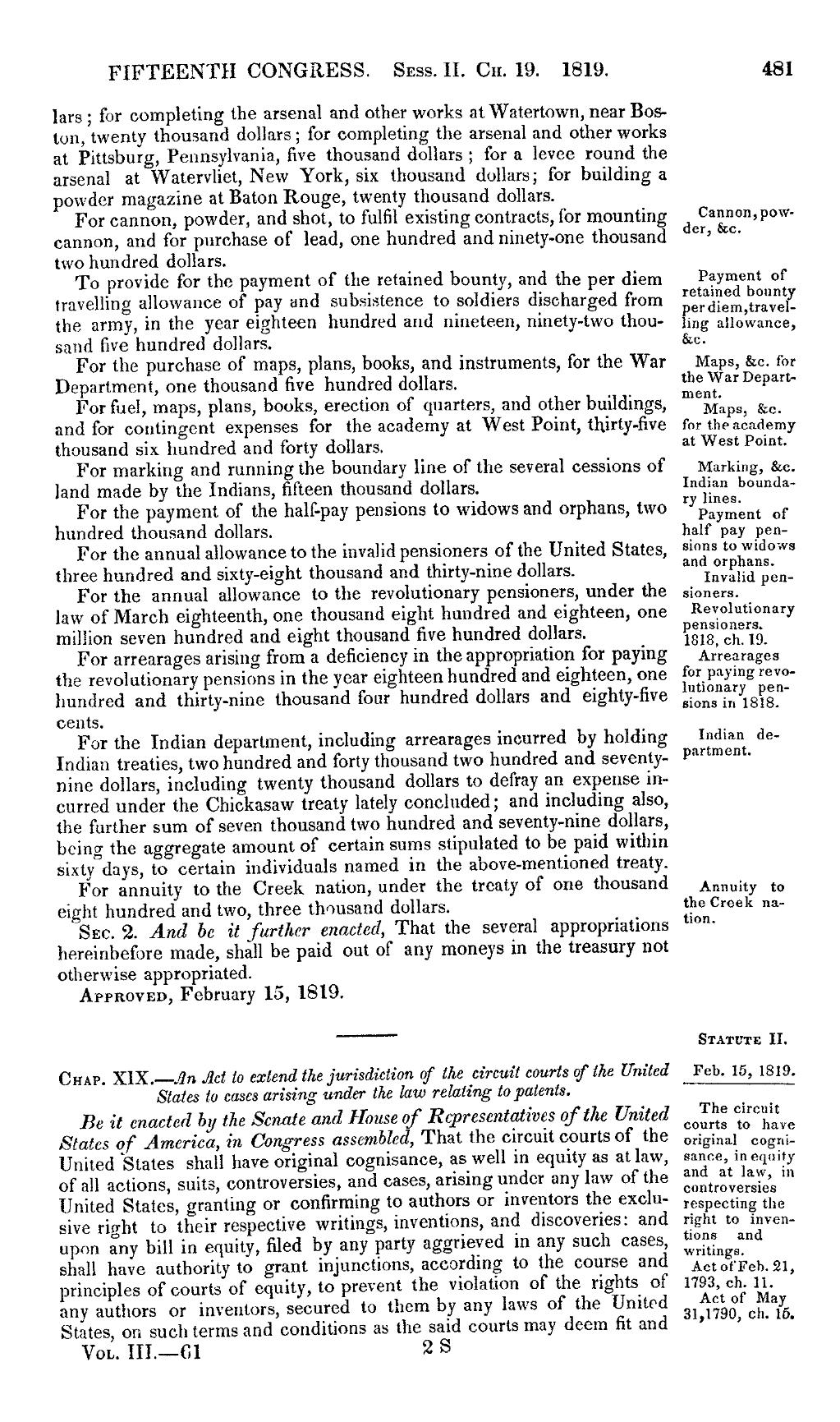lars; for completing the arsenal and other works at Watertown, near Boston, twenty thousand dollars; for completing the arsenal and other works at Pittsburg, Pennsylvania, five thousand dollars; for a levee round the arsenal at Watervliet, New York, six thousand dollars; for building a powder magazine at Baton Rouge, twenty thousand dollars.
Cannon, powder, &c.For cannon, powder, and shot, to fulfil existing contracts, for mounting cannon, and for purchase of lead, one hundred and ninety-one thousand two hundred dollars.
Payment of retained bounty per diem, travelling allowance, &c.To provide for the payment of the retained bounty, and the per diem travelling allowance of pay and subsistence to soldiers discharged from the army, in the year eighteen hundred and nineteen, ninety-two thousand five hundred dollars.
Maps, &c. for the War Department.For the purchase of maps, plans, books, and instruments, for the War Department, one thousand five hundred dollars.
Maps, &c. for the academy at West Point.For fuel, maps, plans, books, erection of quarters, and other buildings, and for contingent expenses of the academy at West Point, thirty-five thousand six hundred and forty dollars.
Marking, &c. Indian boundary lines.For marking and running the boundary line of the several cessions of land made by the Indians, fifteen thousand dollars.
Payment of half pay pensions to widows and orphans.For the payment of the half-pay pensions to widows and orphans, two hundred thousand dollars.
Invalid pensioners.For the annual allowance to the invalid pensioners of the United States, three hundred and sixty-eight thousand and thirty-nine dollars.
Revolutionary pensioners.
1818, ch. 19.For the annual allowance to the revolutionary pensioners, under the law of March eighteenth, one thousand eight hundred and eighteen, one million seven hundred and eight thousand five hundred dollars.
Arrearages for paying revolutionary pensions in 1818.For arrearages arising from a deficiency in the appropriation for paying the revolutionary pensions in the year eighteen hundred and eighteen, one hundred and thirty-nine thousand four hundred dollars and eighty-five cents.
Indian department.For the Indian department, including arrearages incurred by holding Indian treaties, two hundred and forty thousand two hundred and seventy-nine dollars, including twenty thousand dollars to defray an expense incurred under the Chickasaw treaty lately concluded; and including also, the further sum of seven thousand two hundred and seventy-nine dollars, being the aggregate amount of certain sums stipulated to be paid within sixty days, to certain individuals named in the above-mentioned treaty.
Annuity to Creek nation.For annuity to the Creek nation, under the treaty of one thousand eight hundred and two, three thousand dollars.
Sec. 2. And be it further enacted, That the several appropriations hereinbefore made, shall be paid out of any moneys in the treasury not otherwise appropriated.
Approved, Febryary 15, 1819.
Statute II.
Chap. XIX.—An Act to extend the jurisdiction of the circuit courts of the United States to cases arising under the law relating to patents.
Act of Feb. 21, 1793, ch. 11.
Act of May 31, 1790, ch. 15.Be it enacted by the Senate and House of Representatives of the United States of America in Congress assembled, That the circuit courts of the United States shall have original cognisance, as well in equity as at law, of all actions, suits, controversies, and cases, arising under any law of the United States, granting or confirming to authors or inventors the exclusive right to their respective writings, inventions, and discoveries: and upon any bill in equity, filed by any party aggrieved in any such cases, shall have authority to grant injunctions, according to the course and principles of courts of equity, to prevent the violation of the rights of any authors or inventors, secured to them by any laws of the United States, on such terms and conditions as the said courts may deem fit and
